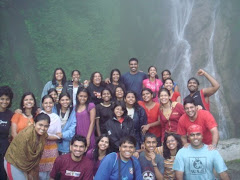It’s one of those days when if you’d say Good Morning, you would really mean it. I mean not just the usual sun-was-shining-birds-were-chirping routine, but a really nice quiet walk in the forest. And what better name would they have found for this place other than Silent Valley.
After a long jeep ride through the forest and short meal of curd rice, I was all set for a good walk. We walked for a short while and reached the river Kunthi. Several members of the group even had a great time shaking the uncertain wooden-iron-rope bridge across the river and testing its strength, and theirs. Fun.
We sat there for a while looking over the river which we were forbidden to jump into. We were about 3 days into the camp (inclusive of train journey) and this was the first real water body in proximity. I am sure more than one of us had resisted the urge the jump out of clothing and plunge in to the water! So as this joy was sacrificed, the youngest of the troop plunged headlong into a photography session by the bridge, soon to be joined by the rest. It is believed that Silent Valley has ever since been echoing of clicks and flashes.
On the way back however, I began to wonder how much longer the name of this place would stay. We were told that one of the reasons for Silent valley being so silent was the absence of a certain insect called Cicada which happens to be very noisy and compensates for the rest of the insect world being largely mute.
We came to a point in the forest on the way back where it was resounding of Cicada. Not one or too but several of them. The sheer vibration the noise was creating in the air would put a Nokia 1100 to shame! Had Shakespeare been alive, he probably would have used this case instead of the rose to prove his what’s-in-a-name jig. But then again, the forest was good, so you don’t really care about the cicada.
We even sat down at a nice little leech-free zone to pen things down before continuing the walk. Not so bad for a good morning in a not-so-Silent Valley.
After a long jeep ride through the forest and short meal of curd rice, I was all set for a good walk. We walked for a short while and reached the river Kunthi. Several members of the group even had a great time shaking the uncertain wooden-iron-rope bridge across the river and testing its strength, and theirs. Fun.

We sat there for a while looking over the river which we were forbidden to jump into. We were about 3 days into the camp (inclusive of train journey) and this was the first real water body in proximity. I am sure more than one of us had resisted the urge the jump out of clothing and plunge in to the water! So as this joy was sacrificed, the youngest of the troop plunged headlong into a photography session by the bridge, soon to be joined by the rest. It is believed that Silent Valley has ever since been echoing of clicks and flashes.
On the way back however, I began to wonder how much longer the name of this place would stay. We were told that one of the reasons for Silent valley being so silent was the absence of a certain insect called Cicada which happens to be very noisy and compensates for the rest of the insect world being largely mute.
We came to a point in the forest on the way back where it was resounding of Cicada. Not one or too but several of them. The sheer vibration the noise was creating in the air would put a Nokia 1100 to shame! Had Shakespeare been alive, he probably would have used this case instead of the rose to prove his what’s-in-a-name jig. But then again, the forest was good, so you don’t really care about the cicada.
We even sat down at a nice little leech-free zone to pen things down before continuing the walk. Not so bad for a good morning in a not-so-Silent Valley.


